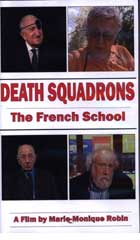
Death Squadrons: The French School 2003
Distributed by First Run/Icarus Films, 32 Court St., 21st Floor, Brooklyn, NY 11201; 800-876-1710
Produced by Ideale Audience, Canal+, Arte France
Directed by Marie-Monique Robin
VHS, color with b&, 60 min.
College - Adult
Area Studies, Latin American Studies, South American Studies, Human Rights, Terrorism, International Relations, Military Studies
Date Entered: 05/28/2004
Reviewed by Jessica Schomberg, Minnesota State University, MankatoThis documentary examines the French doctrine of counterrevolutionary warfare and France’s role in the dictatorships of Latin America, particularly Argentina.
The film begins by exploring the development of France’s theory of revolutionary war from Indochina to Algeria. This theory posits that in counter subversive warfare, “there is no front line; the enemy is everywhere.” This was used to justify military control of the Casbah and the use of torture and death squadrons as an anti-subversive tactic, as put forth by Col. Roger Trinquier in “La Guerre Modèrne” (Modern Warfare). French military personnel then trained others in the methods they had developed, including representatives from Argentina, Chile, Israel, and the United States.
The director traces a path from the development and transmission of this doctrine to the United States’ Operation Phoenix in Vietnam and the transnational South American Operation Condor, which one person interviewed described as a “coordinating apparatus that oversees intelligence for all Latin American dictatorships, supported by European terrorists.” Through interviews with those involved - whose recollections ranged from proud to ashamed - one learns about the torture techniques, death squadrons, disappearances, and civilian casualties that resulted. After discussing the transmission of this counterrevolutionary doctrine through training programs in Algeria and later in Panama, Brazil, and the United States, the film explores the post-training relationship between France and Argentina.
The film consists of interviews, newsreels, photographs, de-classified documents, and excerpts from the motion picture The Battle of Algiers (which was created originally to denounce French actions in Algieria and later used as a training device). While this film explores difficult concepts, it does not go into graphic detail. Also, although it displays subtle opprobrium at the actions of the French, it primarily provides a historical examination of events.
The picture and sound quality are good. The film is narrated in English, and English subtitles are provided during the interviews, which are primarily conducted in French and Spanish.
This program is highly recommended for college libraries.
Awards
- 2004 Award of Merit in Film, Latin American Studies Association